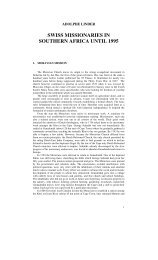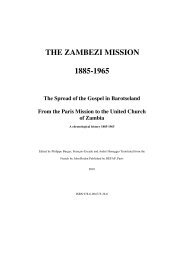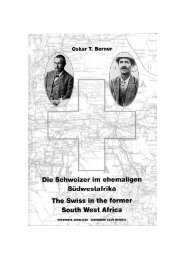THE SWISS IN SOUTHERN AFRICA 1652-1970 - swissroots-za.ch
THE SWISS IN SOUTHERN AFRICA 1652-1970 - swissroots-za.ch
THE SWISS IN SOUTHERN AFRICA 1652-1970 - swissroots-za.ch
You also want an ePaper? Increase the reach of your titles
YUMPU automatically turns print PDFs into web optimized ePapers that Google loves.
Swiss settler, Christiaan Orffer of Bönigen BE arrived 2 June on an English ship 1800.<br />
Only one other Swiss who merits a mention was Lady Anne Barnard’s cook Monsieur<br />
Revel, who arrived from and returned with her to England.<br />
6. SUMMARY OF <strong>SWISS</strong> ARRIVALS DUR<strong>IN</strong>G BATAVIAN RULE<br />
1803-1806<br />
The Batavian Governor designate, General Janssens, arrived with the first contingent<br />
of Batavian troops in December 1802. The British delayed handing over the Cape until<br />
20 February 1803 and General Janssens was ceremoniously inaugurated as Governor of<br />
the Cape of Good Hope on 1 Mar<strong>ch</strong> 1803. Scarcely two months later, on 12 May 1803,<br />
the war between Britain and France and its allies was resumed, and Dut<strong>ch</strong> ships could<br />
no longer venture to sea for fear of being captured by the Royal navy.<br />
Several of the high officials who arrived at the Cape with General Janssens had<br />
surnames indicating that they were descendants of officers in Swiss mercenary<br />
regiments serving the Dut<strong>ch</strong>. The most prominent was Baron Rudolph Anthony De<br />
Salis, who acted as Govenor during Janssens journey of inspection to the interior.<br />
Shortly before the war with England was resumed, Georges-François Grand born 1749<br />
in Lausanne, with an intriguing personal history, arrived to take up a nominal second<br />
position in the government. A number of Swiss arrived members of the Batavian<br />
National Battalions. The most noteworthy, Surgeon Johan Jacob Hablutzel born in<br />
Trüllikon ZH, and Cadet George Andreas Werdmuller born Maastri<strong>ch</strong>t NL, of Zuri<strong>ch</strong><br />
ZH, both settled at the Cape. As happened during the First British Occupation, only one<br />
Swiss settler arrived, the wat<strong>ch</strong>maker Jeremie Auguste Rouvière of Neu<strong>ch</strong>atel. These<br />
three all have numerous descendants in South Africa.<br />
7. SUMMARY OF <strong>SWISS</strong> ARRIVALS DUR<strong>IN</strong>G FIRST FOURTEEN<br />
YEARS OF BRITISH COLONIAL RULE, 1806-1819<br />
After the Second British Occupation of the Cape, a mere trickle of settlers arrived<br />
from Europe. While Britain directed all its resources to defeating Napoleon, and after<br />
Waterloo to the reconstruction of the European political landscape, it paid little attention<br />
to the newly acquired Cape Colony. The first visible <strong>ch</strong>ange in this attitude was the<br />
arrival of the 1820 Settlers who disembarked in Saldanha Bay and Port Eli<strong>za</strong>beth.<br />
During the fourteen years, 1806-1920, Only six Swiss arrivals were noted, of who<br />
four settled in the colony: Jacobus Petrus Fredericus Tou<strong>ch</strong>on of Neu<strong>ch</strong>atel, who hoped<br />
to join the Regiment Meuron now in British service, and when this failed, remained<br />
here illegally in an outlying district. Louis Balthasar Meurant who gave Basel as his<br />
birthplace, arrived with wife and son as band master in a British regiment and decided<br />
to settle here. Johan George Gass who gave St Gall as his birthplace and settled in the<br />
Oudtshoorn District. Friedri<strong>ch</strong> S<strong>ch</strong>indler of Canton Glarus, a bricklayer who settled at<br />
the Cape. Leonard Brunner, who also married and settled in Cape Town as shopkeeper.<br />
In addition one Swiss came to die here: John Andrew Clason, a Swiss Major in the<br />
British Indian army who like many other British army officers sought to recover his<br />
health at the Cape.<br />
30







